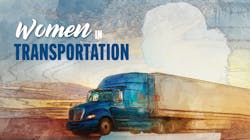Women in Transportation 2022: Trailblazers in trucking
Some women grow up in the trucking industry. Their parents may have been truckers or worked at trucking companies, and they experienced all the industry has to offer—the good, the bad, and the ugly—early on.
Some knew right away the industry was right for them. For others, it took some time.
And then there are the women who fell into the industry by chance, those who served in other fields for many years before they realized trucking and transportation were where they truly belong.
This year, FleetOwner spoke with nine different women across the industry’s ranks. They come from various walks of life, but one commonality they all share is their intent on bringing more women and minorities into trucking and the commercial vehicle space.
Each industry professional sees the potential that the transportation industry has not only for women but for the next generation of younger workers. Networking in trucking and transportation has become a big part of the job, and for many of these industry trailblazers featured this year, that network expands outside of trucking and into individual communities and advocacy work throughout the U.S.
FleetOwner has run its Women in Transportation feature for several years now. Over the course of this week, you’ll read about women who have broken barriers to earn respect from many who had systemic stereotypes built into them. These women also have shattered not only their own glass ceilings but those that society and corporate culture can at times put in place for women in the workplace.
We will highlight two profiles a day over the course of the week in alphabetical order (and add links to the profiles here). For now, we'll leave you with some insights from the women featured this year:
Dana Achartz, director of safety, Commercial Transport: “Put yourself out there. Join your local associations and network. Step out of your comfort zone. When you step out of your comfort zone, that’s when you grow.”
Melissa Albin, technician, Navistar: “I firmly believe in daily aspirations because being a woman in this industry is still extremely challenging. If we can’t reassure ourselves why we are here and doing what we are doing, we’ll lose hope.”
Mary Aufdemberg, general manager of product strategy and market development, Daimler Truck North America: “It’s about unlocking potential in others—helping them see how far they can go, helping them get to a career step they didn’t know was possible, helping ensure they have the relationships and the network that help them feel they are getting the most from their job, helping them feel connected in the company, helping them understand the industry—so we are ultimately helping make our customers be the best they can be in their spaces.”
Nicole Glenn, president and CEO, Candor Expedite: “You’re never going to be fully ready for the next opportunity. Ask outrageously for more leadership, for more guidance, for that next job. It’s okay if people say no, but when someone says yes, that’s when everything changes.”
Vanita Johnson, owner-operator, Executive Enterprises: “When people are willing to help you, let them. It’s okay to accept the help that people are giving you to help you build your knowledge on the road so that one day you can help the next person.”
Sharae Moore, founder and CEO, SHE Trucking: “When people appreciate you, they compensate you. Compensating drivers for their time is the most important piece in keeping and retaining that driver.”
Leah Shaver, president and CEO, National Transportation Institute: “Say yes to every opportunity. The more you do when you show up for work and do extra, volunteer, and put yourself at the front of the line, the more opportunities come to you.”
Lindsey Trent, president and co-founder, Next Generation in Trucking Association: “A lot of times, students may not be succeeding in traditional education. If we can introduce a trucking program and they find something they are good at, they see a future for themselves. We have seen lives change because of these programs.”
Kendra Tucker, CEO, Truckstop.com: “I had been in software for a while and the thing I came to appreciate is that software tastes like chicken. So, I can get up to speed on any industry. What I care about is, can we build technology products that can help people in that industry do their jobs better every day?”
About the Author

Cristina Commendatore
Cristina Commendatore is a past FleetOwner editor-in-chief. She wrote for the publication from 2015 to 2023.
